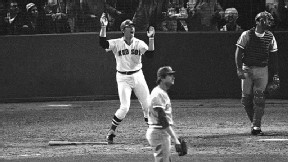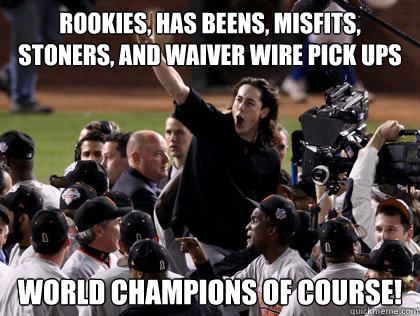1975 World Series, Game 6 - Fenway Park
Big Red Machine vs. Boston Red Sox
Reds up 3 games to 2
Last year, after the Giants won a thrilling World Series, several of us experienced that immediate, gut-wrenching sensation of off-season withdraw and thus threw in an old videotape of this all-time classic.
Copenhagen, November 2010-
We can hear the ancient green ballpark groan at season’s end, worn and weathered under the dirtywhite nightlights beaming dimly on the weathered grass and infield dirt. The faded, grainy VHS image could be of any old baseball field on any one of those damp and frigid nights in late autumn. But it’s not. It’s Fenway in October. Those dizzy dimensions and that palpable anxiety are dead giveaways. We marvel drearily at the many nuances of mid- 70’s Americana: post-Nam exhaustion mingling with stubborn Irish hope; tweed jackets with elbow patches on flailing professor arms; clumsy on-screen text graphics generated by the world’s first computer; and most impressive of all, the personal style of the ballplayers…
Louis Tiant gesticulating with Satchel-like spasms and an array of flamboyant windups refuses to let the Big Red Machine find a groove in front of his Papi – "the Carl Hubbel of Cuba" beaming with joy under his dark brown fedora, shrouded in cigar smoke and untold tales of triumph. Pete Rose all coiled up in clenched stillness, waiting to strike from the left side; steps toward the ball, but holds up, his hands hang back on a slow curve…a hard twist of the hips and he rips a single to right-center. Fred Lynn: ROY, MVP, WS 3-run homer, and then busts his tailbone slamming into the centerfield wall. Joe Morgan’s back elbow flapping up and down in the batters box, his loose and sure fielding sure has style. And all the big hits by low profile players: Cesar Geronimo, a heroic name at a heroic moment, probably gave birth to a son named Sitting Bull Machiavelli, homers to put the Reds up 6-3. Then Bernie Carbo, looking overmatched at the dish, suddenly smacks a game-tying homer while drunk and stoned.
Cormac McCarthy could’ve said this old park hums with age and mystery. Yet from another angle, Fenway seems virgin – classic and pure – patiently waiting for a miracle to break that dreadful Curse. Foul ground and outfield walls not yet polluted by slogans and logos. Every blade of grass and craggy corner acquiescing to the grandeur of the green monster.
-Check it out, man…no fucking ads on the field or the backstop. It’s beautiful.
-There’s Sparky in the dugout, Wes…
-Mmm-hmm
-Toorn dees sheet auf, mahn. Beisbol boring!
-Shut the fuck up, Eduardo. And show some respect for Sparky; he just died.
-What da fuck is Sparky? Who cares?
-Here, take the doobie, CW
-Ooo….nice
-No goddamn ads or flags or flyovers…just baseball. It’s fucking beautiful.
Bottom of the 9th, runners at first and third with no outs, left-fielder George Frasier makes a concentrated catch right at the stands in shallow left and heaves it hard past the noses of nervous on-lookers leaning in to see if Doyle can tag and score. Shouldn't he have tried to slide instead of dive? Probably. The double play kills the inning and quiets the crowd. Everyone here is asleep, scattered on the floor, in the hammock, on the couch and I’m too tired to go into extras. Fisk will have to wait till tomorrow to hit it…
Late morning.
Fast forward to the top of the 11th. Ken Griffey Sr. on first. Morgan pulls one to deep right field, Evans sprinting toward the tiny wall, Griffey sprinting around the bases -- confident it'll go over the short fence or drop for extra bases -- and Evans makes a spectacular if awkward catch with fans hands all around him. He turns and immediately chucks the ball toward first base, off-line but in plenty of time with that strong arm to double-off Griffey.
“The best game I ever played in” – said by a guy who loved winning more than anybody. Pete Rose, a notorious competitor (who even gambled 10,000 bucks per game on his team finishing 162-0), yelled out after Carbo's homer, "This is fun!" Dude should be in the Hall.
And, of course, 12th inning…Fisk waves it fair. The media thus found a way, serendipitously, to sensationalize the game, pre-fabricating narratives and placing cameras everywhere to plan for shots like Fisk hopping up the baseline. This time, though, it was accidental and for that very reason, magical. And the mytho-poetics of this great sport continue to express themselves in popular culture; in mediocre film (Good Will Hunting), high-brow literature (DeLillo’s Underworld), and on the internet (Dock Ellis & the LSD No-No). That majestic homer off the foul pole means the Red Sox live to see another day.
And finally she yawns – a silent roar – creaking under the weight of rowdy fans flooding onto Yawky Way with that stubborn hope still in the air, ‘cuz maybe some damn miracle might release us from this Curse -- tomorrow night in Beantown in the seventh and final game versus the Big Red Machine, with The Spaceman on the mound.
But the Game had become and continues to be “more Machine now than Man….twisted and evil,” reflected not so much in Vader-like villains of yesteryear, (the recently deceased Steinbrenner comes to mind), but the robotic, joyless, business-like metamorphosis of ballplayer into corporate cog. The blind consumer that is the Fan. More subtle then, strikingly obvious now. And as the Machine prevailed in the past, it does so today with an even greater autonomy free from human intervention. And the Spaceman loses.
The Machine is also dominating the way we humans perceive, interpret and appreciate baseball today. Rather than raging in anger at the removal of our favorite players from our favorite teams, we placidly accept the supremacy of a mechanical kind of logic positing greed as the strongest motivator in a multi-billion dollar industry crawling with blood-sucking agents and empty-headed athletes. Ticket prices continue to rise as our teams turn into souless corporations and continue to be disfigured beyond recognition. Fans are arrested at ballgames for not sitting through the Bush-era war chant of “God bless America”. The 7th inning stretch not only stretches our patience with all of the hokey patriotism and jingoist arrogance, but is in itself a stretch in its pathological attempt to link the game of baseball with military might and flag-waving herds of passive consumers. It stretches the thruth like so many other lies of the Bush era, refusing to acknowledge that beisbol is an international game with international citizens who happen to play in the US and Toronto and some of whom are deeply offended and saddened by such contrived nationalism (high-five, Carlos Delgado).
On yet another militant level, the violent mechanism of the Police and their intimidating presence – shooting taser guns at foolhardy fans for nothing more than running on the field – adds to the paranoia and dehumanization of our culture at large, and baseball in particular. In the past, it was we Fans who determined when we would run on the field together (see one of "Baseball's Best Moments": KC vs. NYY 1977, Chambers HR), in a triumph of joy over security.
And, again, the Machine now consumes a new discourse, dictating the way in which we value life, players, and how we value the Game – this time all according to strictly quantifiable sets of subjective criteria.
We can ask ourselves, without a trace of nostalgia, where are the Charlie Hustles of today? A guy who could coach and play (balls-out) simultaneously, all while using that passion and cockiness and wealth to gamble on his team to win every fucking game they played in.
Not even bothering to interview Rose along with teammates Morgan and Bench, the demeaning mlb network removes the wild card from the deck, playing it safe, tossing the same pre-written softballs to the dumb jocks and watching their woozy and bloated heads blather on about the same story they’ve told a thousand times in the same way. But these dumb jocks were great players and played hard and smart baseball to beat the Beantowners in that conveniently forgotten seventh and final game. The Big Red Machine were World Series champs.
Now, in 2010, Brian "The Machine" Wilson and that magical mess of misfits shut down the over-pumped Texas sluggers to win the World Series. Reluctantly embraced by the Machine proper, even the misfits had to be commodified. Fake coal-black beards, Kung-Fu Panda outfits, and even Torture Ball as a brand are all assimilated into the Machine as part of the corporate takeover of baseball culture. And we, the fans, are a bunch of suckers.
Welcome to the Machine.








